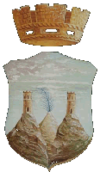Belmonte Calabro
| Belmonte Calabro | ||
|---|---|---|
| Comune | ||
| Comune di Belmonte Calabro | ||
 |
||
|
||
| Location of Belmonte Calabro in Italy | ||
| Coordinates: 39°10′N 16°5′E / 39.167°N 16.083°E | ||
| Country | Italy | |
| Region | Calabria | |
| Province / Metropolitan city | Cosenza (CS) | |
| Frazioni | Annunziata, Vadi, Marina di Belmonte, Santa Barbara, Salice, Spineto | |
| Government | ||
| • Mayor | Luigi Provenzano | |
| Area | ||
| • Total | 23.89 km2 (9.22 sq mi) | |
| Elevation | 262 m (860 ft) | |
| Population (2007) | ||
| • Total | 2,269 | |
| • Density | 95/km2 (250/sq mi) | |
| Demonym(s) | Belmontesi | |
| Time zone | CET (UTC+1) | |
| • Summer (DST) | CEST (UTC+2) | |
| Postal code | 87033 | |
| Dialing code | 0982 | |
| Patron saint | Assumption of Mary | |
| Saint day | 15 August | |
| Website | Official website | |
Belmonte Calabro, known simply as Belmonte prior to the proclamation of the Kingdom of Italy, is a town and comune in the province of Cosenza, in Calabria (Southern Italy). The town is perched on a hilltop on the coast of the Tyrrhenian Sea.
Belmonte was founded in about 1270, under the reign of King Charles I of Anjou, with the construction of a castle in the territory of Amantea by Drogone di Beaumont, the marshal responsible for new fortification in Calabria, in order to provide resistance against partisans fighting for the claimant Conradin of Hohenstaufen.
During the War of the Sicilian Vespers (1282), Belmonte was conquered by Sicilian-Aragonese troops. It was elevated to the status of county, and assigned to Peter Salvacossa. In 1360 the county was awarded by Queen Joan II of Naples to a family of Amantea, which maintained it until 1443. In that year the Aragonese transformed Belmonte into a barony and assigned it to the Tarsia family, who maintained it until 1578. During the feudal tenure of this family the petrarchan poet Galeazzo di Tarsia composed his canzoniere, or Book of Songs, in the castle of Belmonte.
Under the Tarsia lordship, Belmonte was besieged several times: during the invasions of Charles VIII and Louis XII of France, between 1495 and 1503, and again in 1528 under the French marshal Lautrec. The Tarsia were succeeded by the Ravaschieri Fieschi, of the Counts Fieschi di Lavagna, a family of Genoese bankers. Feudal tenure of Belmonte is recorded to have been purchased from the Tarsia for 28,220 ducats. Under the Ravaschieri churches were constructed in Belmonte, fortifications built and palaces laid out, including the Palazzo Ravaschieri Fieschi della Torre. In 1619 the title of Prince Belmonte was granted to the Ravaschieri Fieschi by King Philip III of Spain.
...
Wikipedia


